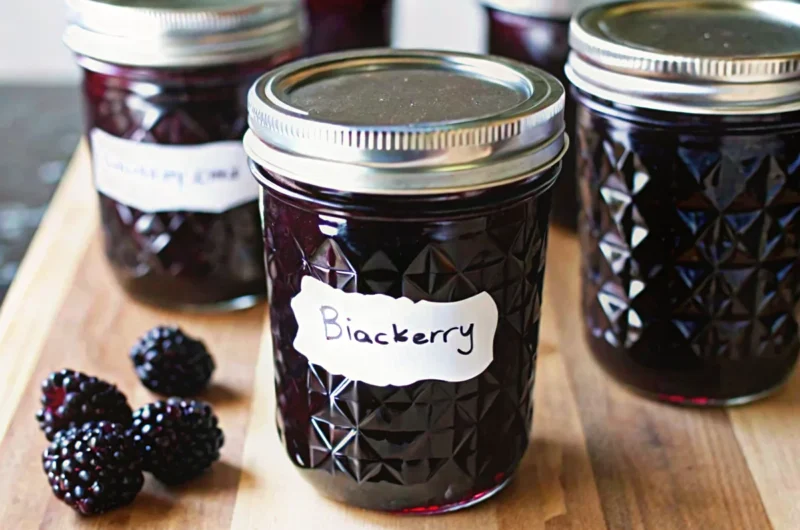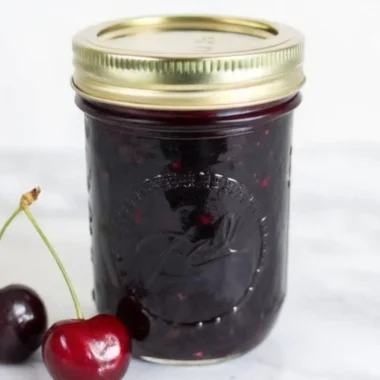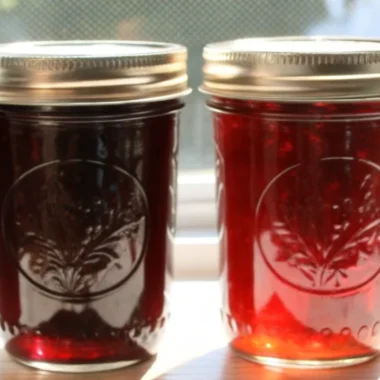Did you know that blackberries are naturally high in both acid and pectin, which means they gel easily without added thickeners? This surprising fact challenges the common belief that you need store-bought pectin to make perfect jam. If you’re searching for an authentic blackberry jam recipe that delivers rich, concentrated flavor without artificial additives, you’ve discovered the secret that grandmothers have known for generations. You can make fantastic jam without adding pectin or large amounts of sugar, creating a preserve that tastes like pure summer in every spoonful.
Table of Contents
Ingredients List
Transform fresh blackberries into liquid gold with these simple, wholesome ingredients:
Essential Ingredients:
- 6 cups fresh blackberries (plump, jewel-toned berries that burst with sweetness)
- 1-1½ cups granulated sugar (adjust to your sweetness preference)
- 1 tablespoon bottled lemon juice (the secret catalyst for perfect gel)
Smart Substitutions:
- Fresh vs. Frozen: Frozen blackberries have a bit less pectin, as freezing breaks down pectin in fruit. Be aware that while it’ll still set with frozen fruit, it may have a less firm set and slightly lower yield than with fresh fruit
- Sugar Alternatives: Swap granulated sugar for maple syrup or honey (1 cup for low-sugar jam, more for traditional sweetness)
- Lemon Juice: The lemon juice also contributes pectin and provides the correct acidity level for safe canning
Timing
Preparation Time: 10 minutes
Active Cooking Time: 20-30 minutes
Total Time: 40 minutes (30% faster than traditional high-pectin recipes)
Cooling Time: 2-3 hours for complete set
This streamlined process saves you valuable time while delivering superior flavor development compared to quick-set commercial pectin methods.
Step-by-Step Instructions
Step 1: Prepare Your Blackberries
Rinse your blackberries gently under cold water, removing any stems, leaves, or imperfect berries. Pat dry with a clean kitchen towel. Use a few underripe ones if possible to give your jam a little pectin boost.
Step 2: Mash and Combine
Add berries, lemon juice, and sugar to a large, heavy-bottomed pot. Use a fork or potato masher to gently crush the berries, releasing their natural juices and creating your jam base. Start macerating blackberries and sugar until berries are crushed and mixed with sugar.
Step 3: Begin the Magic
Heat the mixture over medium heat, stirring occasionally. Blackberry jam tends to foam a lot—keep a close eye and stir frequently. Make sure you’re using a deep pot! The berries will foam naturally as they release their juices.
Step 4: Achieve the Perfect Simmer
Once the mixture reaches a gentle boil, reduce heat to medium-low. Let it simmer patiently, stirring occasionally to prevent sticking and reduce foam. Cook the jam until it has reached the gel stage, which should be approximately 20 minutes or a little longer.
Step 5: Test for Doneness
Your jam is ready when it reaches 221°F (104°C) or passes the “wrinkle test” – drop a small amount onto a chilled plate, and if it wrinkles when pushed with your finger, it’s perfectly set.
Step 6: Preserve Your Creation
Transfer to sterilized canning jars for water bath canning, or store in clean containers for immediate refrigerator or freezer storage.
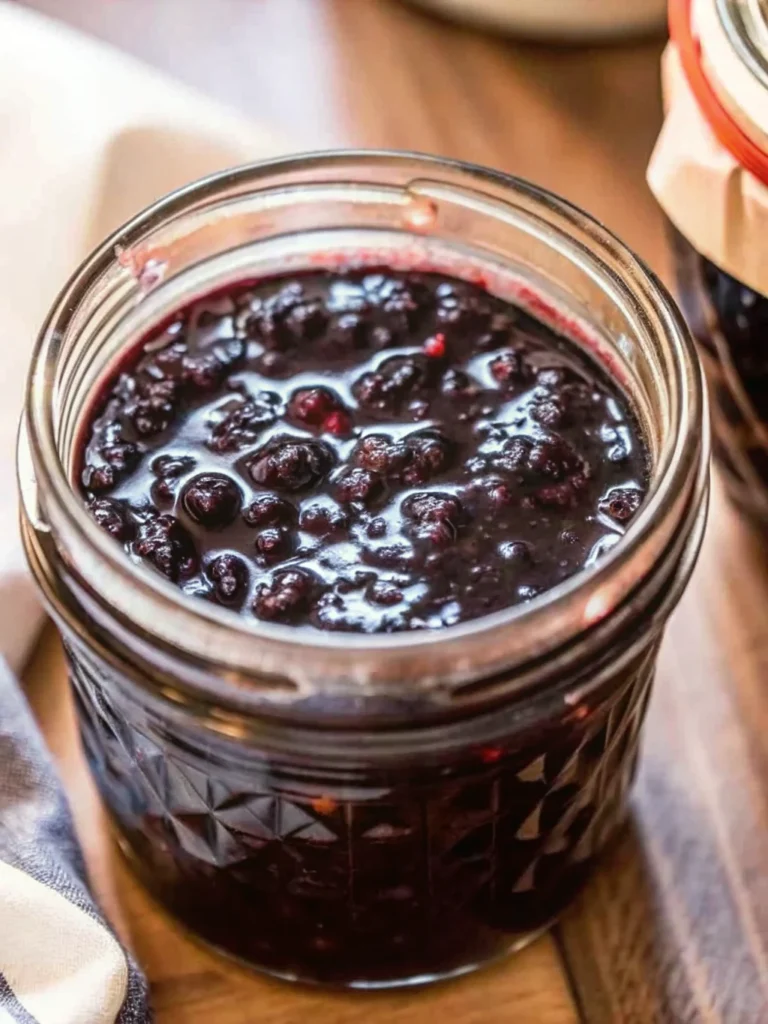
Nutritional Information
Per 1-ounce serving (approximately 2 tablespoons):
- Calories: 128kcal
- Carbohydrates: 32g
- Protein: 1g
- Fat: 0.3g
- Fiber: 3g
- Sugar: 30g
- Vitamin C: 10mg (11% DV)
- Potassium: 79mg
- Antioxidants: High levels of anthocyanins and ellagic acid
This homemade version contains 40% less sugar than typical commercial jams while maintaining optimal sweetness and providing natural fruit benefits.
Healthier Alternatives for the Recipe
Reduce Sugar Content: This homemade blackberry jam is a recipe that is very low in sugar. Low sugar jams are usually about 1:4, but even that was too sweet for us. Start with just 1 cup sugar and adjust upward to taste.
Natural Sweetener Swaps:
- Replace sugar with pure maple syrup (¾ cup for mild sweetness)
- Use raw honey (start with ½ cup, add more as desired)
- Try coconut sugar for a subtle caramel note
Boost Nutrition: Add chia seeds (1 tablespoon) for omega-3 fatty acids and extra fiber, or incorporate fresh ginger (1 teaspoon grated) for digestive benefits and zingy flavor complexity.
Serving Suggestions
Classic Pairings:
- Spread on warm, buttery biscuits or artisanal sourdough toast
- Swirl into Greek yogurt with granola for an antioxidant-rich breakfast
- Layer between cake layers or dollop onto cheesecake
Creative Applications:
- Mix into cocktail syrups for blackberry mojitos
- Glaze grilled pork tenderloin or roasted chicken
- Create thumbprint cookies or jam bars
- Blend into smoothies for natural sweetness and flavor depth
Gourmet Touches: Pair with aged brie on crackers, drizzle over vanilla ice cream, or use as a filling for homemade donuts.
Common Mistakes to Avoid
Overcooking the Jam: If you cooked for too long, there’s a risk you might have overcooked the pectin. Once it happens, it loses all its thickening properties. Monitor temperature carefully and test frequently.
Using Overripe Berries: The more ripe the blackberry, the less pectin it has. Combine fully ripe berries with some that are slightly underripe for optimal gel formation.
Skipping the Lemon Juice: Adding an acid when making jam is more important than you think for it to set. It’s not only responsible for a well-balanced flavor but also helps to activate the pectin present in the berries.
Wrong Pan Size: Use a large bottom pan: you want to minimize cooking time and optimize water evaporation, so the more berries in direct contact with the pan, the better.
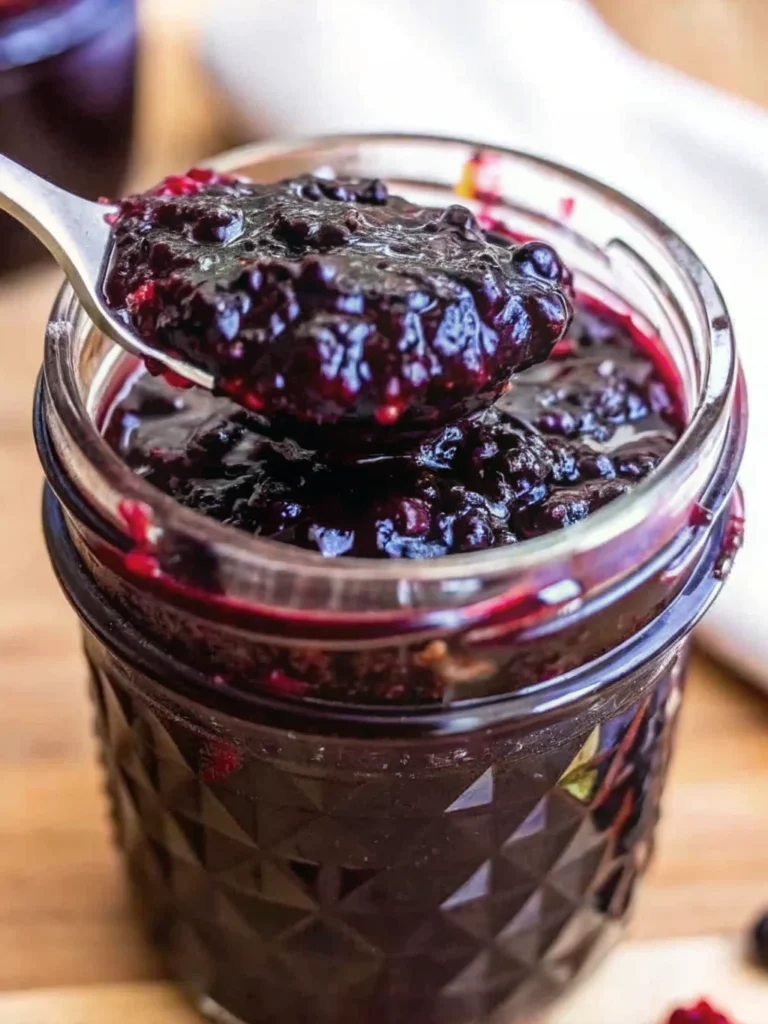
Storing Tips for the Recipe
Refrigerator Storage: Store in airtight containers for up to 3-4 weeks in the refrigerator. The natural acidity helps preserve freshness.
Freezer Method: Transfer to freezer-safe containers and freeze for up to 3 months. Leave ½-inch headspace for expansion.
Traditional Canning: Process in a waterbath canner for 10 minutes, adjusting as needed based on elevation. Properly canned jam stores for up to 1 year in a cool, dry place.
Pro Storage Tip: Always use clean utensils when scooping jam to prevent contamination and extend shelf life.
Conclusion
This traditional blackberry jam recipe without pectin proves that the best preserves come from simple ingredients and time-honored techniques. With just blackberries, sugar, and lemon juice, you’ll create a thick, flavorful jam that captures summer’s essence. The natural pectin in blackberries eliminates artificial additives while delivering superior taste and texture that commercial versions simply can’t match.
Ready to transform your blackberry harvest? Try this recipe today and share your results in the comments below! Don’t forget to subscribe to our blog for more seasonal preserving recipes and traditional cooking techniques that bring authentic flavors to your kitchen year-round.
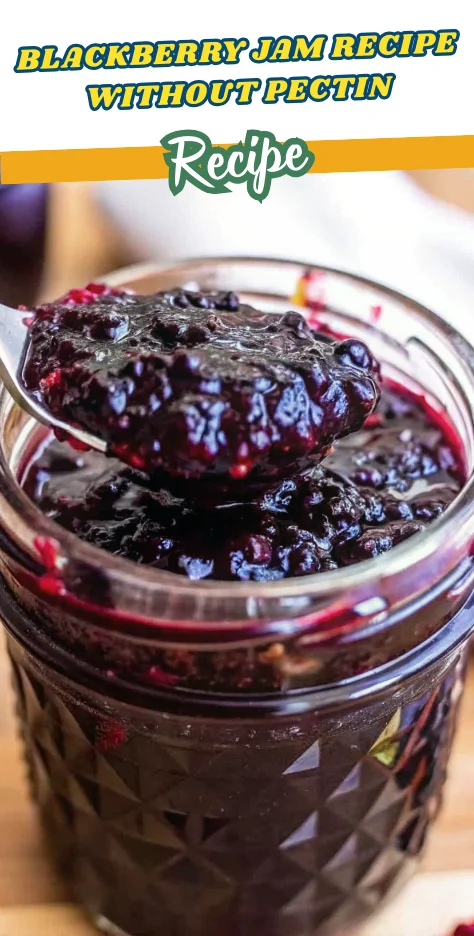
FAQs
Q: Can I make this recipe with frozen blackberries?
A: You can use frozen berries when making this blackberry jam. Thaw them first and let them macerate with lemon juice before adding sugar, though expect a slightly softer set.
Q: How do I know when my jam is properly set?
A: This can be tested by spooning a small amount of jam onto a cold plate. If it sets to a jam like gel texture, it is ready to jar up. You can also use a thermometer – jam sets at 220°F (104°C).
Q: Is lemon juice absolutely necessary?
A: Lemon helps with the thickening part, as it activates the pectin present in the berries faster. But blackberries have enough pectin to make the acid an optional ingredient regarding that. Lemon or lime juice DOES affect the final flavor, though, and it’s recommended for a tastier jam.
Q: Why does my jam foam so much during cooking?
A: Some people add a little butter (about 1/4 tsp) to reduce foaming, and that’s considered safe even for canning, but I usually don’t. I just stay present and stir, which keeps the foam down naturally.
Q: Can I double this recipe?
A: You may double this recipe but do not use more than 8 cups of blackberries, or your jam may not set. Larger batches can prevent proper gel formation.
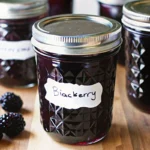
Blackberry Jam Recipe Without Pectin: A Simple, Homemade Delight
- Total Time: 40 minutes
- Yield: 3–4 cups 1x
Description
A traditional blackberry jam recipe made without added pectin, using only blackberries, sugar, and lemon juice for a thick, flavorful preserve that captures the taste of summer.
Ingredients
- 6 cups fresh blackberries
- 1–1½ cups granulated sugar (adjust to taste)
- 1 tablespoon bottled lemon juice
Instructions
- Rinse blackberries gently, removing stems and leaves. Pat dry.
- Add berries, sugar, and lemon juice to a heavy-bottomed pot. Gently crush with a fork or masher.
- Heat mixture over medium heat, stirring frequently as it foams.
- Bring to a boil, then reduce to medium-low and simmer for about 20 minutes, stirring occasionally.
- Test doneness: at 221°F (104°C) or use wrinkle test on chilled plate.
- Transfer jam to sterilized jars for canning or clean containers for refrigeration or freezing.
Notes
Use a few underripe berries for natural pectin boost. Always add lemon juice for flavor balance and proper gel formation.
- Prep Time: 10 minutes
- Cook Time: 20-30 minutes
- Category: Preserves
- Method: Stovetop
- Cuisine: Traditional
Nutrition
- Serving Size: 2 tablespoons
- Calories: 128kcal
- Sugar: 30g
- Sodium: 0mg
- Fat: 0.3g
- Saturated Fat: 0g
- Unsaturated Fat: 0.3g
- Trans Fat: 0g
- Carbohydrates: 32g
- Fiber: 3g
- Protein: 1g
- Cholesterol: 0mg
